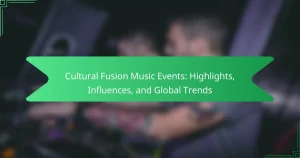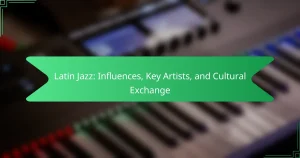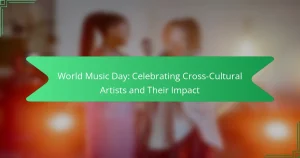Indigenous music festivals are essential for cultural preservation and community engagement. They showcase traditional music, promote cross-cultural understanding, and stimulate local economies. These events face challenges like funding limitations and cultural appropriation, yet they remain vital for celebrating diverse heritages. Key festivals worldwide, such as the National Indigenous Music Awards and the Gathering of Nations, highlight the richness of Indigenous cultures.
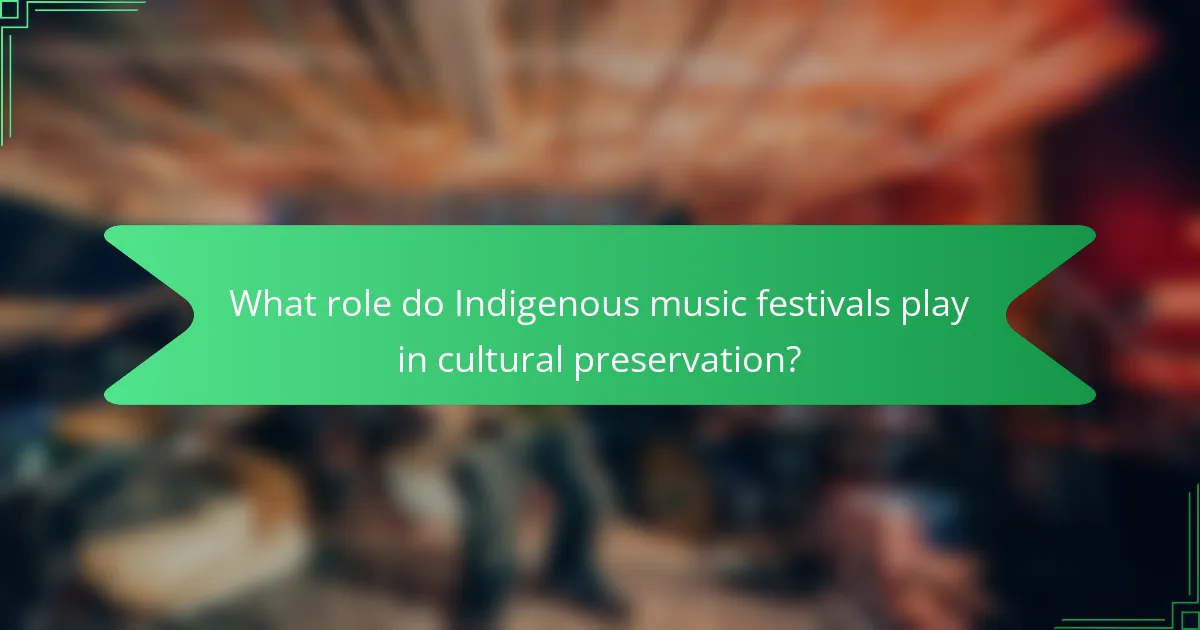
What role do Indigenous music festivals play in cultural preservation?
Indigenous music festivals play a crucial role in cultural preservation by showcasing traditional music and fostering community engagement. These events create spaces for storytelling, passing down heritage, and promoting Indigenous languages. Festivals often feature unique performances that highlight specific cultural practices, enhancing awareness and appreciation among diverse audiences. Additionally, they stimulate economic opportunities for Indigenous artists, further supporting the sustainability of their cultural expressions.
How do these festivals contribute to community identity?
Indigenous music festivals strengthen community identity by celebrating cultural heritage and fostering unity. These events provide a platform for sharing traditional music, stories, and art, which reinforces cultural values. Festivals often feature local artists, enhancing community pride and encouraging intergenerational connections. As a result, attendees experience a sense of belonging and shared identity, vital for cultural preservation.
In what ways do they promote traditional music forms?
Indigenous music festivals promote traditional music forms by showcasing diverse cultural expressions and fostering community engagement. These festivals provide platforms for Indigenous artists to perform, preserving unique musical styles. They also educate attendees about the significance of traditional music in cultural identity. Additionally, workshops and interactive sessions encourage participation, enhancing appreciation for these art forms.
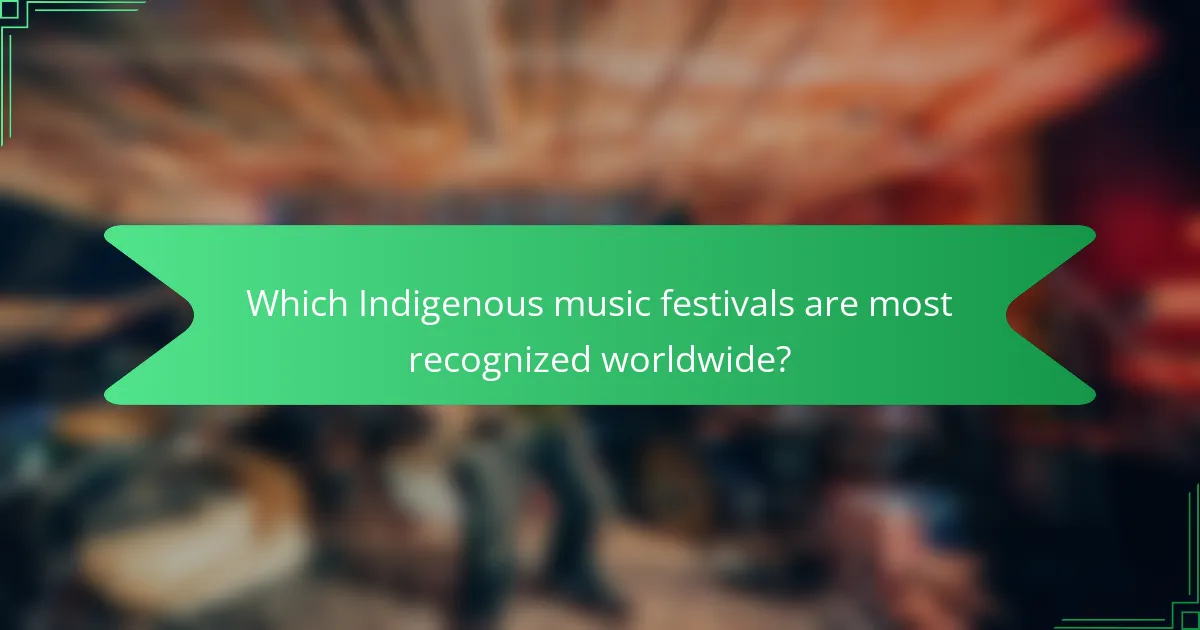
Which Indigenous music festivals are most recognized worldwide?
Some of the most recognized Indigenous music festivals worldwide include the National Indigenous Music Awards in Australia, the Gathering of Nations in the United States, and the Festival of Indigenous Music in Canada. These festivals celebrate Indigenous cultures, showcasing traditional and contemporary music while promoting cultural heritage. The National Indigenous Music Awards highlight emerging Indigenous artists, while the Gathering of Nations features a powwow alongside various music performances. The Festival of Indigenous Music focuses on preserving and sharing Indigenous musical traditions, drawing international attention. Each festival serves as a platform for cultural expression and community engagement.
What unique features distinguish festivals like the National Indigenous Peoples Day?
Indigenous music festivals like National Indigenous Peoples Day are distinguished by their emphasis on cultural heritage, community engagement, and diverse musical expressions. These festivals showcase traditional and contemporary Indigenous music, often featuring local artists and performers. Unique attributes include the incorporation of storytelling and cultural practices, creating immersive experiences for attendees. Additionally, they often promote social justice and awareness of Indigenous issues, fostering a sense of unity and pride within the community.
How does the Sydney Festival celebrate Indigenous artists?
The Sydney Festival celebrates Indigenous artists through dedicated performances, workshops, and collaborative projects. These initiatives highlight the rich cultural heritage and diversity of Indigenous music. The festival showcases traditional and contemporary Indigenous art forms, fostering greater understanding and appreciation. Additionally, it provides a platform for Indigenous voices, ensuring their stories and music reach broader audiences. This commitment enhances cultural representation and supports the sustainability of Indigenous artistic practices.
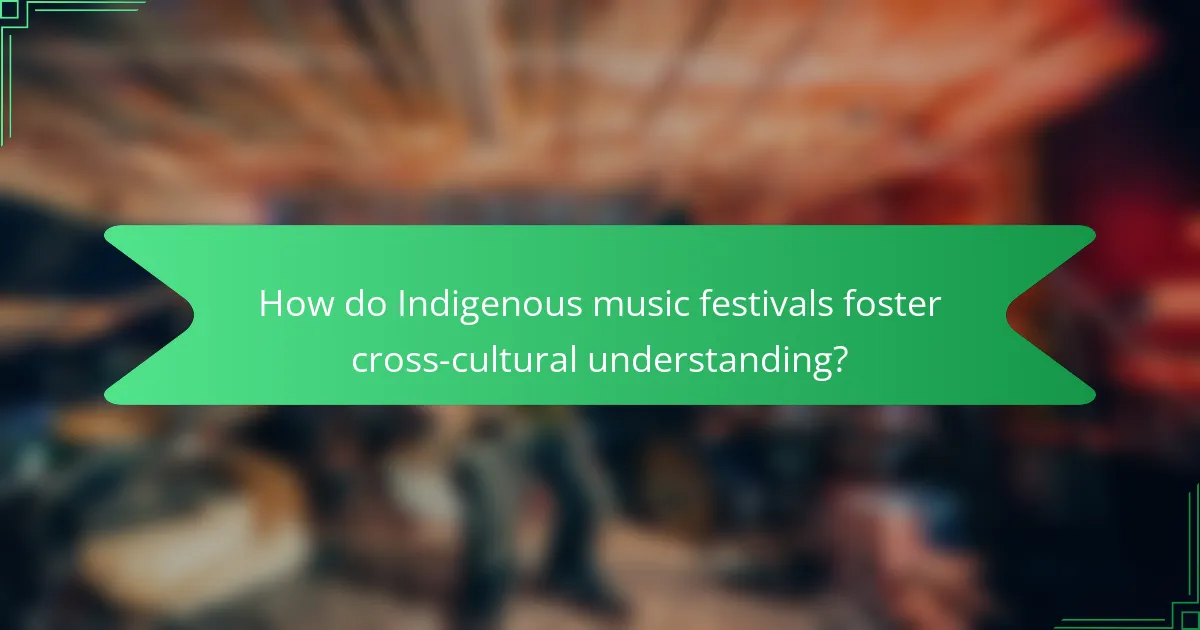
How do Indigenous music festivals foster cross-cultural understanding?
Indigenous music festivals foster cross-cultural understanding by promoting dialogue and appreciation among diverse communities. These events showcase traditional music, dance, and storytelling, allowing attendees to experience Indigenous cultures firsthand.
Through workshops and performances, participants gain insights into the historical and contemporary issues faced by Indigenous peoples. This immersive experience encourages respect and collaboration, bridging cultural gaps.
Moreover, festivals often feature collaborations between Indigenous and non-Indigenous artists, highlighting shared values and fostering unity. As a result, these events become platforms for cultural exchange and mutual learning, enriching the broader societal fabric.
Overall, Indigenous music festivals serve as vital spaces for nurturing empathy and understanding across cultures.
What initiatives encourage collaboration between Indigenous and non-Indigenous artists?
Indigenous music festivals foster collaboration between Indigenous and non-Indigenous artists through shared performances and cultural exchanges. These events promote understanding and appreciation of diverse musical traditions, creating a platform for joint artistic projects. For example, festivals often feature workshops that encourage collaboration and mentorship, allowing artists to learn from each other. Additionally, initiatives like grant programs support partnerships, enabling artists to create innovative works that reflect both cultures.
How do these events help to educate audiences about Indigenous cultures?
Indigenous music festivals educate audiences by showcasing diverse cultural expressions and traditions. These events often feature traditional performances, storytelling, and workshops that highlight the history and significance of Indigenous music. As a result, attendees gain insights into the values, beliefs, and practices of Indigenous communities. Festivals also promote dialogue and understanding between cultures, fostering respect and appreciation for Indigenous heritage. By participating in these celebrations, audiences can experience the vibrancy of Indigenous cultures firsthand, deepening their knowledge and connection to this rich cultural landscape.
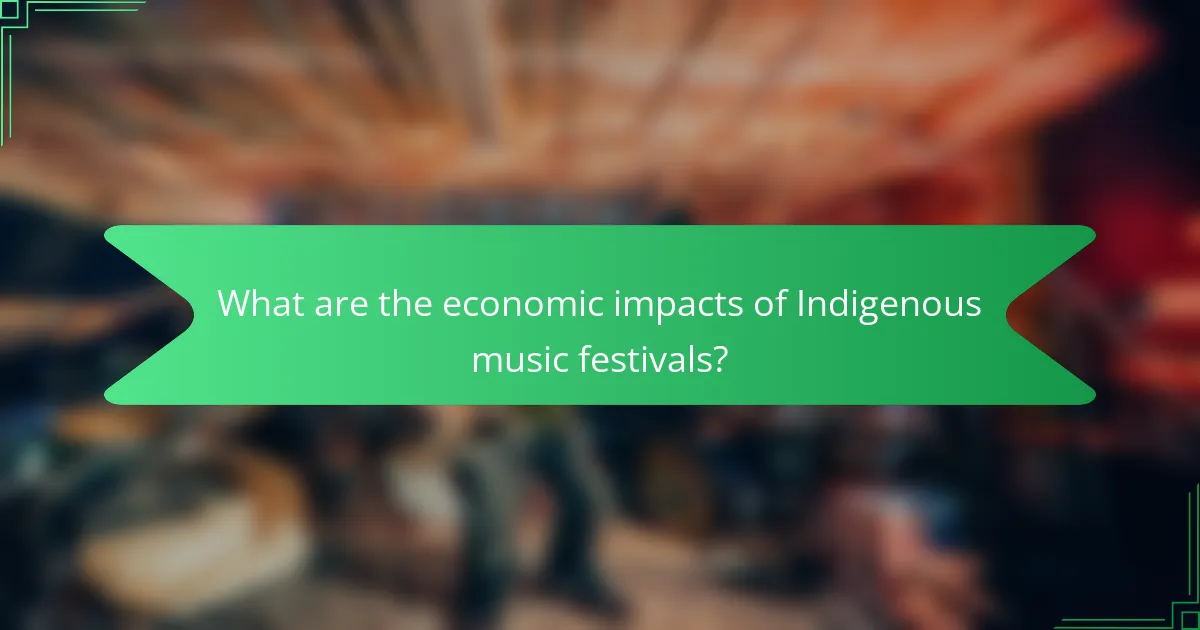
What are the economic impacts of Indigenous music festivals?
Indigenous music festivals significantly boost local economies through tourism, job creation, and cultural exchange. These events attract visitors who spend on accommodations, food, and crafts, fostering community growth. For instance, festivals can generate millions in revenue, supporting local artists and businesses. Additionally, they promote cultural heritage, enhancing community pride and identity. These economic impacts underscore the importance of preserving Indigenous music traditions.
How do these festivals support local economies?
Indigenous music festivals significantly boost local economies by attracting tourism and creating jobs. These events generate revenue through ticket sales, food vendors, and local artisans. Additionally, they promote cultural heritage, encouraging visitors to explore surrounding attractions. For example, a festival can increase hotel occupancy rates and stimulate local businesses. Economic impact studies often reveal that such festivals yield a return on investment, enhancing community pride and sustainability.
Which sponsorship opportunities are most beneficial for Indigenous festivals?
Sponsorship opportunities that support Indigenous festivals include partnerships with brands aligned with cultural values. These sponsors often provide financial support, resources, and marketing exposure.
1. Cultural Organizations: Collaborations with entities that promote Indigenous culture enhance authenticity and community engagement.
2. Local Businesses: Regional companies benefit from increased visibility and community goodwill through sponsorship.
3. Government Grants: Funding from local or national programs supports Indigenous initiatives and cultural preservation.
4. Corporate Social Responsibility Programs: Companies seeking to enhance their public image may sponsor festivals to demonstrate commitment to diversity.
5. Media Partnerships: Collaborations with media outlets increase festival reach and promote Indigenous narratives effectively.
6. Educational Institutions: Sponsorships from universities can provide funding and resources while fostering cultural education.
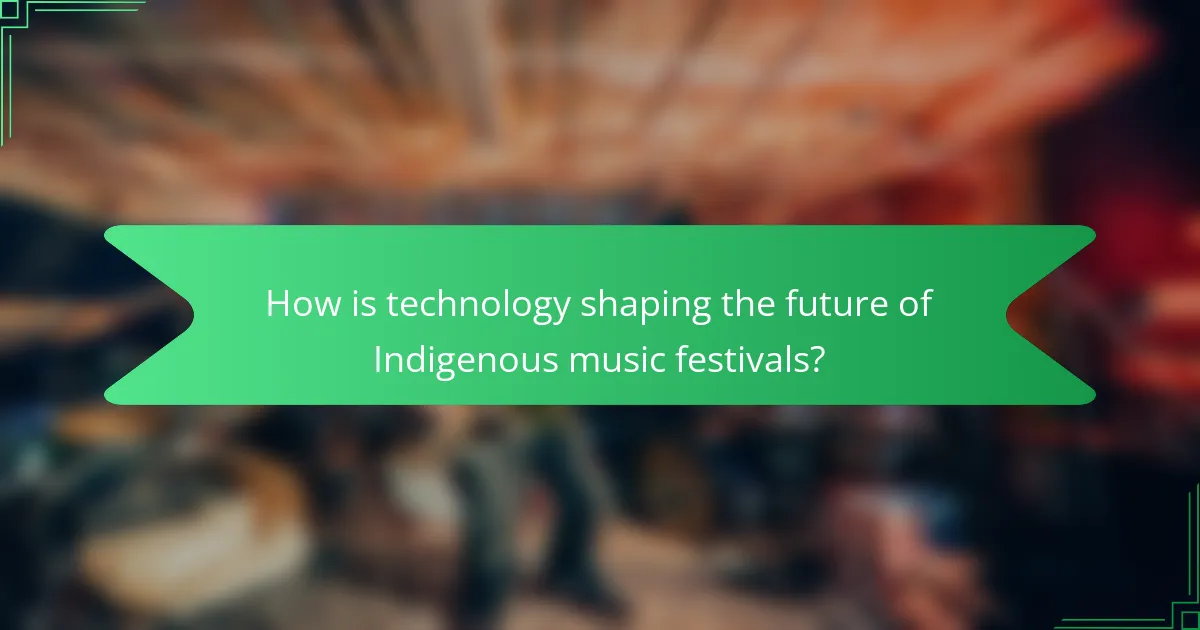
How is technology shaping the future of Indigenous music festivals?
Technology is transforming Indigenous music festivals by enhancing cultural expression and accessibility. Digital platforms allow for broader audience engagement, enabling virtual participation and showcasing diverse Indigenous artists. Social media amplifies festival reach, fostering community connections and cultural exchange. Additionally, technology preserves traditional music through digital archiving, ensuring cultural heritage is accessible for future generations.
What role do social media platforms play in promoting these events?
Social media platforms significantly enhance the visibility and reach of Indigenous music festivals. They facilitate real-time engagement, allowing artists and organizers to connect with diverse audiences. Social media campaigns can showcase unique attributes of these festivals, such as cultural performances and community involvement, attracting more attendees. Platforms like Instagram and Facebook enable sharing of rich visual content, amplifying the cultural heritage celebrated at these events. As a result, Indigenous music festivals can foster greater appreciation and understanding of diverse cultures globally.
How are virtual festivals expanding audience reach?
Virtual festivals expand audience reach by breaking geographical barriers and promoting inclusivity. Indigenous music festivals leverage technology to connect global audiences with diverse cultural heritage. By streaming performances online, they attract participants who may not physically attend. This approach enhances cultural exchange and appreciation, fostering a sense of community among diverse listeners. Additionally, social media platforms amplify outreach, allowing for real-time interactions and engagement. As a result, these festivals can celebrate unique traditions while reaching wider audiences than ever before.
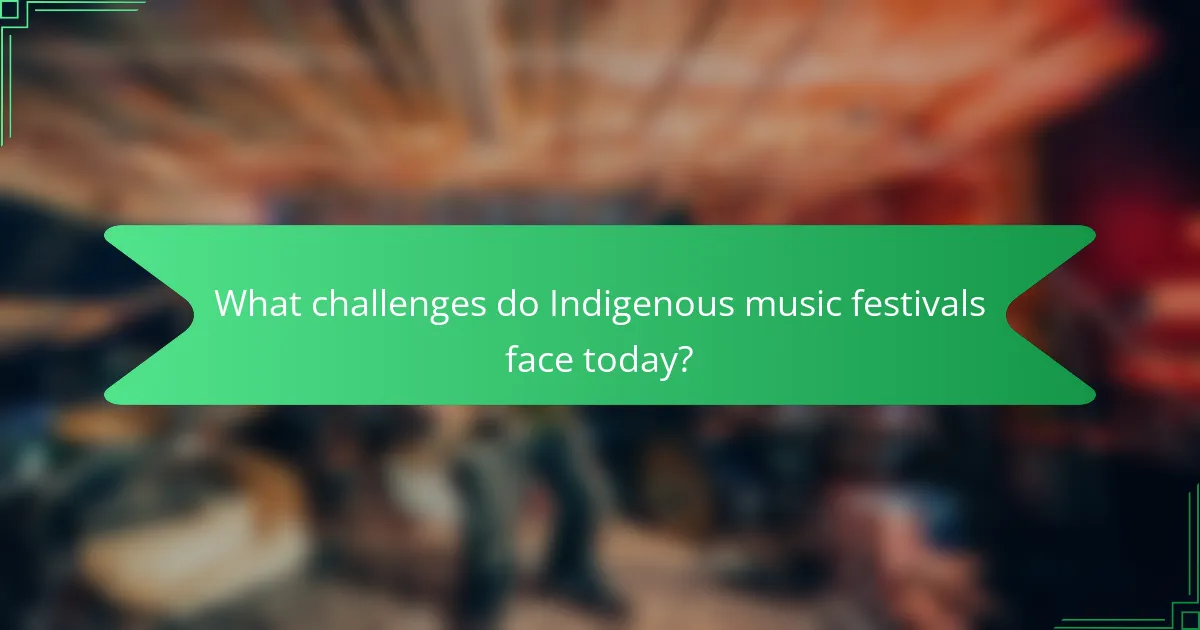
What challenges do Indigenous music festivals face today?
Indigenous music festivals face challenges such as funding limitations, cultural appropriation, and the need for greater representation. These obstacles hinder the celebration of diverse cultures and heritage.
Funding remains a critical issue as many festivals rely on grants and sponsorships. As a result, financial instability can threaten their continuity. Cultural appropriation poses another challenge, where non-Indigenous entities may exploit Indigenous music without proper acknowledgment.
Additionally, ensuring authentic representation of Indigenous artists is vital. Festivals must prioritize showcasing a wide range of voices to maintain cultural integrity. Addressing these challenges is essential for the sustainable growth of Indigenous music festivals.
How do funding issues affect festival sustainability?
Funding issues significantly hinder the sustainability of Indigenous music festivals. Limited financial resources restrict event planning, artist participation, and community engagement. Festivals often rely on grants and sponsorships, making them vulnerable to economic fluctuations. As a result, many festivals struggle to maintain cultural authenticity and outreach, impacting their long-term viability.
What measures are being taken to address cultural appropriation?
Indigenous music festivals are taking proactive measures to address cultural appropriation by promoting authentic representation and collaboration. Organizers prioritize featuring Indigenous artists, ensuring they receive fair compensation and recognition. Festivals often include educational components, such as workshops and discussions, to raise awareness about cultural significance. Additionally, partnerships with Indigenous communities help safeguard traditions while fostering respect and understanding among attendees. These initiatives create a platform for genuine cultural exchange, celebrating diversity and heritage without exploitation.
How can festivals enhance accessibility for diverse audiences?
Indigenous music festivals enhance accessibility by promoting inclusivity and celebrating diverse cultures. These festivals often feature multi-language programming, ensuring all attendees can engage. Additionally, they provide physical accommodations, such as wheelchair access and sensory-friendly spaces, to cater to various needs. By showcasing Indigenous artists, these events foster cultural appreciation and understanding, creating a welcoming environment for all.
What are the best practices for organizing an Indigenous music festival?
To organize an Indigenous music festival effectively, prioritize community involvement and cultural representation. Engage local Indigenous artists and leaders to ensure authenticity and respect for traditions.
Establish a diverse program that showcases various musical styles and cultural expressions. Incorporate workshops and discussions to educate attendees about Indigenous heritage and issues.
Ensure accessibility and inclusivity in venue selection and event logistics. Promote sustainable practices to honor the environment and community values.
Lastly, leverage social media and partnerships with local organizations to enhance visibility and attract a broader audience.
